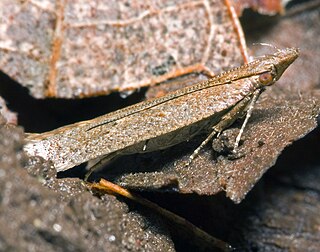
The Gelechiidae are a family of moths commonly referred to as twirler moths or gelechiid moths. They are the namesake family of the huge and little-studied superfamily Gelechioidea, and the family's taxonomy has been subject to considerable dispute. These are generally very small moths with narrow, fringed wings. The larvae of most species feed internally on various parts of their host plants, sometimes causing galls. Douglas-fir (Pseudotsuga) is a host plant common to many species of the family, particularly of the genus Chionodes, which as a result is more diverse in North America than usual for Gelechioidea.

Dichomeris is a genus of moths in the family Gelechiidae erected by Jacob Hübner in 1818.
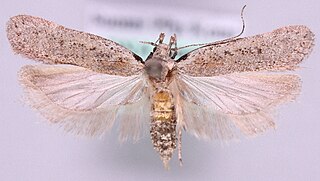
Gelechia is a genus of moths in the family Gelechiidae. The type species is Gelechia rhombella.

Helcystogramma is a genus of moths in the family Gelechiidae. The genus was erected by Philipp Christoph Zeller in 1877.
Photodotis is a genus of moth in the family Gelechiidae.

Polyhymno is a genus of moths in the family Gelechiidae.

Thiotricha is a genus of moths in the family Gelechiidae, subfamily Thiotrichinae.
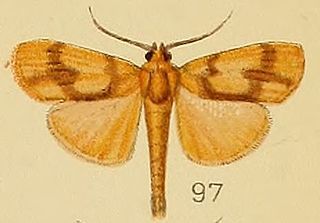
Ulopeza is a genus of moths of the family Crambidae. It was described by Philipp Christoph Zeller in 1852.

Pycnarmon is a genus of moths of the family Crambidae described by Julius Lederer in 1863.

Phostria is a genus of moths of the family Crambidae.

Anatrachyntis is a genus of moths in the family Cosmopterigidae. Some authors include it in Pyroderces.
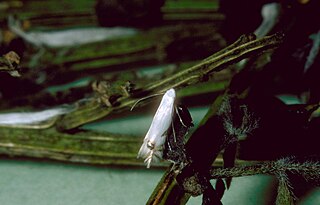
Leucoptera is a genus of moths in the family Lyonetiidae. Its members are leaf borers many of which can cause severe damage to plant crops, such as coffee or apples.
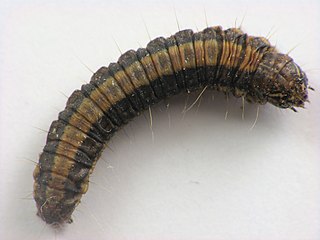
The Epipaschiinae are a subfamily of snout moths. More than 720 species are known today, which are found mainly in the tropics and subtropics. Some occur in temperate regions, but the subfamily is apparently completely absent from Europe, at least as native species. A few Epipaschiinae are crop pests that may occasionally become economically significant.
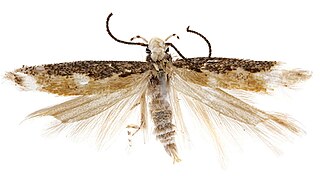
Gelechiinae is a subfamily of moths in the family Gelechiidae. It was described by Henry Tibbats Stainton in 1854.

Anomologinae is a subfamily of moths in the family Gelechiidae.
Trichembola segnis is a moth in the family Gelechiidae. It was described by Edward Meyrick in 1918. It is found in southern India and Assam.
Trichembola oreia is a moth in the family Gelechiidae. It was described by Jean Ghesquière in 1940. It is found in North Kivu in the Democratic Republic of the Congo.
Trichembola palynata is a moth in the family Gelechiidae. It was described by Jean Ghesquière in 1940. It is found in the area of the former province Équateur in the Democratic Republic of the Congo.
Trichembola unimaculata is a moth in the family Gelechiidae. It was described by Mikhail Mikhailovich Omelko and Natalia Viktorovna Omelko in 1993. It is found in Korea and the Russian Far East.












